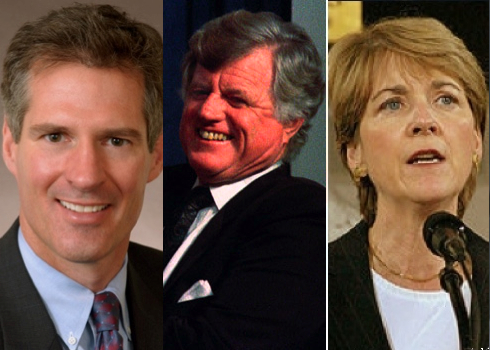In preparation for what they expect to be Republican Scott Brown’s victory in the Massachusetts Senate special election tonight, conservatives and Republicans have unearthed a novel and ironic precedent, which they’re using to argue that, if he wins, Brown should be seated right away as the 41st vote against health care reform.
Senate rules require that all newly-elected Senators be certified as winners by their home states before they can be sworn in. But on November 6, 1962, none other than Ted Kennedy himself won a special election to fill his own brother’s Senate seat in Massachusetts, and was sworn in the very next day–two full weeks before his victory was certified, and three weeks before that certification arrived in Washington.
1962 is a long way back, and according to Senate historian Don Ritchie, the relevant rule has been in place since well before then.
“Senators have always had to be certified to be sworn in,” he says.
So why the exception for Kennedy? The short answer is the Senate disregarded its own rules and seated him despite lacking certification (the state certificate arrived a few weeks later). The longer answer is that there are some important differences between Kennedy’s election 47 years ago and this year’s race in Massachusetts.
Most crucially, according to Ritchie, the Senate was not in session in November, 1962, which means nobody was around to object to seating him immediately–the rules were waived and Kennedy was sworn in without certification. “Kennedy was sworn in the next day,” Ritchie emails. “He won by a commanding majority, and the Senate was not in session, so there was no challenge, even though the paperwork for his certification came later.”
In other words, if Republicans want to seat Brown (should he win) a la Kennedy the Senate would have to waive the rule, and swear in the 41st vote against health care. That won’t be easy: Rules are suspended by unanimous consent, which means any one member can say “no way.”
Senate leadership has been very clear: they’re waiting for official documentation. “When there is a certified winner in Massachusetts, the Senate has received appropriate papers, and the Vice President is available, the successor to Senators Kennedy and Kirk will be sworn in,” says Jim Manley, spokesman to Senate Majority Leader Harry Reid.
That means, among other things, military and absentee ballots will have to be counted, in accordance with Massachusetts law, before a winner can be certified–a requirement that was not in effect back in 1962.
And, Democrats say, the precedent is not on Republicans’ side. Just this Congress, two Democrats–Sen. Roland Burris (D-IL) and Sen. Al Franken (D-MN)–have had to grapple with the certification question. Burris had to go to the state Supreme Court to get a declaration that his appointment by soon-to-be-impeached Gov. Rod Blagojevich constituted a fully valid certification, even though the Illinois Secretary of State refused to co-sign the document. In Franken’s case, Republicans refused to allow him to be seated until months and months of GOP-led court challenges to his very narrow win were resolved. (Minnesota law didn’t allow for a certificate to be issued until the state court challenges were resolved.)
One can go back further still. In 1994, Republican Fred Thompson won a special election and took over the seat Harlan Matthews had been appointed to, and in 2002, Republican Jim Talent won a special election and took over the seat Jean Carnahan had been appointed to. In both cases, the appointed Senators continued to serve and vote until the winners had been certified and sworn in.
That’s where part two of the conservative case for a swift seating comes into play. They point to the 2007 House special election in Massachusetts of Rep. Niki Tsongas (D-MA), who was seated before officially certified. When Tsongas won, the clerk of the House requested, and the Massachusetts Secretary of the State provided, a special letter which stood as a temporary stand in for official certification.
“The Secretary sent a letter to the Clerk of the House at the Clerk’s request, which said, on the basis of unofficial returns, it appears…Niki Tsonagas has been elected, there has been no contest — in other words, no recount — and [she was] sworn into the House,” said Brian McNiff, spokesman for spokesman for Massachusetts Secretary of State William Galvin. “The Senate doesn’t do that.”
“The Secretary has said if the Senate requests a similar letter and the circumstances are similar, it’s obvious who won the election, he would send a similar letter to the Senate,” McNiff added. “At this point it would be a waste of time to send a letter to them, since under their rules they’re not acting on unofficial returns.”
There are more wrinkles, too. The House and Senate are different bodies, governed by different rules, and it isn’t clear whether the Secretary of the Senate would honor an unofficial certification. (We’re working on an answer to that question.) And in Tsongas’ case, the seat she filled was actually vacant–awaiting certification would have meant delaying representation for Tsongas’ district. By contrast, the Senate seat in Massachusetts will be filled by Sen. Paul Kirk (D-MA) until a new member is sworn in.
All of which is to say: it’s not quite as simple as those demanding a quick turnover would like.






